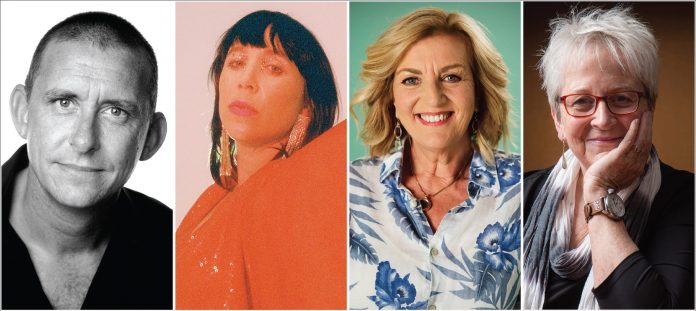Comedian Peter Rowsthorn says he can be a bit potty-mouthed when he’s appearing at corporate functions but aims never to overstep the mark in offending people.
He says the Benny Hill-type days of comedians referring to a woman’s ‘norks’ are long gone – and rightly so.
There’s no need to belittle any minority says the former Kath and Kim actor and adopted WA son.
Peter, along with a distinguished line-up of opinion leaders including Tom Tilley of Triple J; Kado Muir Aboriginal artist, anthropologist and Indigenous rights activist; writer Liz Byrski; and Veena Sahajwalla, a leading expert in the field of recycling science, will be sharing their thoughts at the free Disrupted Festival of Ideas at the State Library of Western Australia on June 18 and 19.
This year’s Disrupted Festival explores the themes of honesty and truth.
Peter will appear as part of a panel on Saturday, June 18, from 3pm to 4pm to discuss Ageing Disgracefully, alongside performer, author and scriptwriter Jean Kittson, novelist, non-fiction writer, former journalist and broadcaster Liz Byrski, and ARIA Award nominated singer, songwriter and producer, Katy Steele.
Although, at 59, Peter considers himself a spring chicken, the discussion will revolve around ageing and what that means in terms of working and living, dealing with taboo topics, and what it means for artists and authors, getting older, trying to remain visible and heard.
Peter, who has now been living in WA for 12 years, arrived here with his wife Gabrielle, with whom he shares four children, because Gabrielle wanted to be closer to her Mum in her later years.
He’s best known for his role as Brett Craig, the long-suffering husband of Kim Craig, played by Gina Riley in Kath and Kim, but the stand-up comedian has built a successful career out of hosting corporate and private functions as well as regular television roles.
This is Peter’s first involvement with the Disrupted Festival and says his panel has been asked to consider when comedy filters go off as you get older, are they restricted by the new ways of woke thinking and do they care at their age?
“I don’t believe in any of that,” he says.
“It’s a bit of a bugbear that you can’t say anything anymore – yes you can – just don’t say anything stupid, don’t say sexist things or racist things. It’s really basic, if your sensibilities as a person are clear and good you’ll generally have no worries with any of that.
“Maybe if you have some supressed issues that come out via an occasional comment here and there, you might trip up, but comically I should be able to use the material I’ve had for 30 years.
“It still works for an 18-year-old to an 80-year-old.”
Peter says he has got it wrong plenty of times, particularly in front of the corporate sector which can be sensitive about the use of swearing.
“I can be a bit potty-mouthed at times, but only because I’m being a bit too loose, but not in a way that is racist or sexist, it’s just me being a bit too fruity for the function itself.”
When it comes to woke culture and subjects like the City of Stirling changing its name, Peter says he is all in favour of that.
“Stirling obviously did some amazing things, a great discoverer of stuff, but he also has a pretty poor reputation about how he treated the locals.
“I’m pretty much on the side of paying back for any mistakes done. I wouldn’t care if they changed all the English names to Aboriginal terms if it’s going to make everyone feel a bit better.
“People might think that’s too lefty or whatever, but I wasn’t a part of Stirling’s era, it was poor work by middle-aged white men.”
While watching television programs like Benny Hill doesn’t make him cringe, Peter says it was all part of him growing up, but we need to recognise that the world has changed since then.
“I’ve seen people who I’ve worked with in the 90s lose relevance because their style didn’t shift and got stuck in that 80s style, not necessarily saying that much wrong, but getting it rhythmically wrong.
“But my dream is to get in the camper van and go round to old people’s homes,” he laughs.
Other panels on the weekend include:
‘Talking about death won’t kill you’ hosted by journalist and media consultant Rita Aldred-Sagger and featuring Satayam Brown, co-owner of Surya Health; Lana Glogowski, CEO of Palliative Care WA; Dr Jaya Dantas, Dean International in Curtain University’s Faculty of Health Sciences; and Melanie Hawkes, Department of Fire and Emergency Services WA.
‘Thriving Minds and Emotional Females: the cost of high-pressure industries and beating burnout’ an in-conversation with: best-selling author and workplace health consultant, Dr Jenny Brockis; and viral blogger and author of Emotional Female, Dr Yumiko Kadota.
‘A smart vision for a sustainable future: SMaRT technologies and MICROfactories creating sustainable materials and products from waste resources’ with internationally recognised materials scientist and winner of 2022 NSW Australian of the Year, Professor Veena Sahajwalla.
As well as the sessions at the State Library, sessions will be live streamed and available later on the State Library’s YouTube page.
The Disrupted Festival program and more information are available on the State Library’s website disrupted.slwa.wa.gov.au/.



































